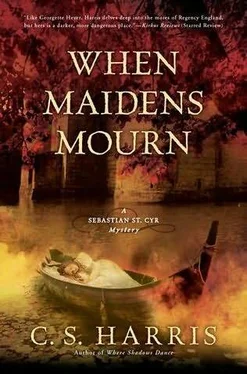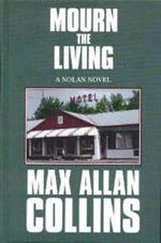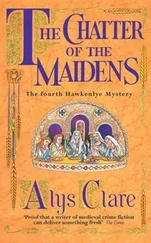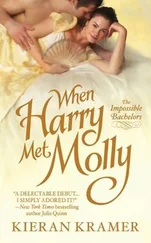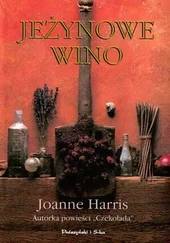C Harris - When maidens mourn
Здесь есть возможность читать онлайн «C Harris - When maidens mourn» весь текст электронной книги совершенно бесплатно (целиком полную версию без сокращений). В некоторых случаях можно слушать аудио, скачать через торрент в формате fb2 и присутствует краткое содержание. Жанр: Классический детектив, на английском языке. Описание произведения, (предисловие) а так же отзывы посетителей доступны на портале библиотеки ЛибКат.
- Название:When maidens mourn
- Автор:
- Жанр:
- Год:неизвестен
- ISBN:нет данных
- Рейтинг книги:5 / 5. Голосов: 1
-
Избранное:Добавить в избранное
- Отзывы:
-
Ваша оценка:
- 100
- 1
- 2
- 3
- 4
- 5
When maidens mourn: краткое содержание, описание и аннотация
Предлагаем к чтению аннотацию, описание, краткое содержание или предисловие (зависит от того, что написал сам автор книги «When maidens mourn»). Если вы не нашли необходимую информацию о книге — напишите в комментариях, мы постараемся отыскать её.
When maidens mourn — читать онлайн бесплатно полную книгу (весь текст) целиком
Ниже представлен текст книги, разбитый по страницам. Система сохранения места последней прочитанной страницы, позволяет с удобством читать онлайн бесплатно книгу «When maidens mourn», без необходимости каждый раз заново искать на чём Вы остановились. Поставьте закладку, и сможете в любой момент перейти на страницу, на которой закончили чтение.
Интервал:
Закладка:
He twisted around to stare back at the imposing row of eighteenth-century town houses that rose above the terrace. The disappearance of the two young children added both an urgency and a troubling new dimension to the murder of Gabrielle Tennyson. Had the boys, too, fallen victim to Gabrielle's killer? For the same reason? Or were the children simply in the wrong place at the wrong time? And if they hadn't suffered the same fate as their cousin, then where were they now?
Sebastian brought his gaze back to the top of the steps, his eyes narrowing as he studied the thin, drab-coated man buying a sausage from the cart.
It was the same man he'd seen earlier, at Tower Hill.
Bloody hell.
Pushing away from the railing, Sebastian strolled toward the sausage seller. Pocketing the drab-coated man's coin, the sausage seller handed the man a paper-wrapped sausage. Without seeming to glance in Sebastian's direction, the man took a bite of his sausage and began to walk away.
He was a tallish man, with thin shoulders and a round hat he wore pulled low on his face. Sebastian quickened his step.
He was still some ten feet away when the man tossed the sausage aside and broke into a run.
Chapter 10
The man sprinted around the edge of the terrace and dropped out of sight.
Sebastian tore after him, down a crowded, steeply cobbled lane lined with taverns and narrow coffeehouses that emptied abruptly onto the sun-splashed waterfront below. A flock of white gulls rose, screeching, to wheel high above the broad, sparkling river.
The genteel houses of the Adelphi Terrace had been constructed over a warren of arch-fronted subterranean vaults built to span the slope between the Strand and the wharves along the river. Sebastian could hear the man's booted feet pounding over the weathered planking as he darted around towering pyramids of wine casks and dodged blue-smocked workmen unloading sacks of coal from a barge. Then the buff-coated man threw one quick look over his shoulder and dove under the nearest archway to disappear into the gloomy world beneath the terrace.
Hell and the devil confound it, thought Sebastian, swerving around a mule cart.
`Hey!' shouted a grizzled man in a cap and leather apron as the mule between the traces of his cart snorted and kicked.
`What the bloody ell ye doin?'
Sebastian kept running.
One behind the other, Sebastian and the drab-coated man raced through soaring, catacomblike arches, the bricks furred with soot and mold and perpetual dampness. They sprinted down dark tunnels of warehouses tenanted by wine sellers and coal merchants, and up dimly lit passages off which opened stables that reeked of manure and dirty straw, where cows lowed plaintively from out of the darkness.
`Who the hell are you?' Sebastian shouted as the man veered around a rotten water butt, toward the dark opening of a narrow staircase that wound steeply upward. `Who?'
Without faltering, the man clambered up the stairs, Sebastian at his heels. Round and round they went, only to erupt into a steeply sloping corridor paved with worn bricks and lined with milk cans.
Breathing hard and fast, the man careened from side to side, upending first one milk can, then another and another, the cans rattling and clattering as they bounced down the slope like giant bowling pins, filling the air with the hot splash of spilling milk.
`God damn it,' swore Sebastian, dodging first one can, then the next. Then his boots hit the slick wet bricks and his feet shot out from under him. He went down hard, slamming his shoulder against a brick pier as he slid back down the slope and the next milk can bounced over his head.
He pushed up, the leather soles of his boots slipping so that he nearly went down again. He could hear the man's running footsteps disappearing around the bend up ahead.
Panting heavily now, Sebastian tore around the corner and out a low archway into the unexpected sunlight of the open air. He threw up one hand to shade his suddenly blinded eyes, his step faltering.
The lane stretched empty and silent before him.
The man was gone.
After leaving Carlton House, Hero spent the next several hours at a bookseller's in Westminster, where she selected several items, one of which proved to be very old and rare. Then, sending her purchases home in the charge of a footman, she directed her coachman to the British Museum.
It was at an exhibition of Roman sarcophagi at the British Museum that Hero had first met Gabrielle Tennyson some six years before. Initially, their interaction had been marked more by politeness than by cordiality. Both might be gently born, well-educated women, but they belonged to vastly different worlds. For while the Jarvises were an ancient noble family with powerful connections, Gabrielle Tennyson came from a long line of barristers and middling churchmen gentry rather than noble, comfortable rather than wealthy.
But with time had come respect and, eventually, true friendship. Their interests and ambitions had never exactly coincided: Gabrielle's passion had all been for the past, whereas Hero's main focus would always be the economic and social condition of her own age. Yet their shared willingness to challenge their society's narrow gender expectations and their determination never to marry had forged a unique and powerful bond between them.
Now Hero, much to her mingling bemusement and chagrin, had become Lady Devlin. While Gabrielle...
Gabrielle was dead.
The bells of the city's church towers were just striking three when Hero's coachman drew up outside the British Museum. She sat with one hand resting casually on the carriage strap, her gaze on the towering portal of the complex across the street as she listened to the great rolling clatter and dong of the bells swelling over the city.
Built of brick in the French style with rustic stone quoins and a slate mansard roof, the sprawling mansion had once served as the home of the Dukes of Montagu, its front courtyard flanked by long colonnaded wings and separated from Great Russell Street by a tall gateway surmounted by an octagonal lantern. She watched a man and a woman pause on the footpath before the entrance, confer for a moment, and go inside. Then two men deep in a heated discussion, neither of whom Hero recognized, exited the gateway and turned east.
One after another the bells of the city tapered off into stillness, until all were silent.
Hero frowned. She had come in search of an antiquary named Bevin Childe. Childe was known both for his formidable scholarship and for his fanatical adherence to a self-imposed schedule. Every Monday, Tuesday, and Thursday between the hours of ten and three he could be found in the Reading Room of the museum. At precisely three o'clock, he left the museum and crossed the street to a public house known as the Pied Piper, where he ate a plate of sliced roast beef and buttered bread washed down by a pint of good, stout ale. This was followed by a short constitutional around nearby Bedford Square, after which he returned to the Reading Room from four until six. But today, Childe was deviating from his prescribed pattern.
The minutes ticked past. `Bother,' said Hero softly under her breath.
`My lady?' asked her footman, his hand on the open carriage door.
`Perhaps...' she began, then broke off as a stout man in his early thirties dressed in a slightly crumpled olive coat and a high-crowned beaver came barreling through the museum's gateway, his head down, a brass-headed walking stick tucked under one arm. He had the face of an overgrown cherub, his flesh as pink and white as a baby's, his small mouth pursed as if with annoyance at the realization that he was nearly ten minutes late for his luncheon.
`Mr. Childe,' called Hero, descending from the carriage, her furled parasol in hand. `What a fortunate encounter. There is something I wish to speak with you about. Do let's walk along for a ways.'
Читать дальшеИнтервал:
Закладка:
Похожие книги на «When maidens mourn»
Представляем Вашему вниманию похожие книги на «When maidens mourn» списком для выбора. Мы отобрали схожую по названию и смыслу литературу в надежде предоставить читателям больше вариантов отыскать новые, интересные, ещё непрочитанные произведения.
Обсуждение, отзывы о книге «When maidens mourn» и просто собственные мнения читателей. Оставьте ваши комментарии, напишите, что Вы думаете о произведении, его смысле или главных героях. Укажите что конкретно понравилось, а что нет, и почему Вы так считаете.
